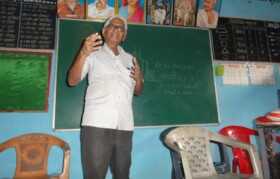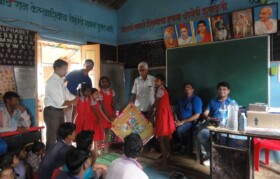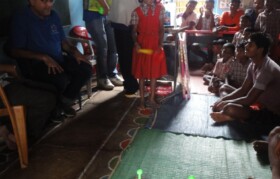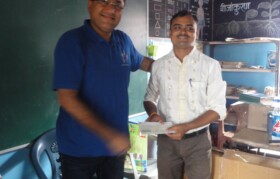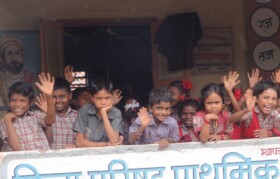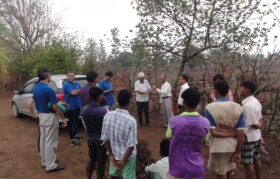New School Inclusion – Barafpada

This post has already been read 638 times!
We started the academic year 2016-17 on 25th June, 2016 with the formal inclusion of Barafpada. This is a small school with around 60 students, managed by two dedicated teachers. We had done the due diligence a few months back. Apart from the common issues, in terms of the infrastructure, grant etc, this school had major challenge with the water resources. They just had one bore-well, which was non functional. They did not have any other source of water in the near vicinity. They managed to purchase water from the nearby well, which used to be preserved for almost a week.
Apart from the basic induction process, we had a good session on water resource management by an expert Mr Paranjape, who has been in this field for last 16 years. He is running an NGO called Jalvardhini, which helps villagers preserve the rain water for short term and long term usage. He shared quite a few valuable inputs with us. As per him
- We get 2500 mm rain water per year, which is 10 times more than what we need.
- Most of the water go to the sea through the river route.
- By creating pits around the bore-well, we ensure that the water percolates down the ground and the area get recharged.
- While we can focus on rain-water harvesting, we still don’t have full control on the way the water would move under the surface.
He suggested us to get started with a simple model, wherein the roof water can be diverted to a tank after considerable filtering. As per him, if we build a tank with the help of iron mesh and cement with around 12000 Liter capacity, then we should be able to manage it till Jan end or so. We have approved the project and the work would start once we get the blue-print for the same. We kicked off various projects related to Mid-day meal, First Aid Box, Hygiene etc in the school.
Photo Gallery
First Kick off meeting with the teachers
As per the new rule, every school should have at least classes up to 5th standard. Out of 11 schools, only 3 schools had classes beyond 5th. This step has ensured that the students from 4th standard (who could have gone to different school) can continue with us for one more year. Having mentioned that, this step has posed challenges in some schools. Ideally, one needs at least 3 teachers to manage 5 classes. However, except for one or two schools, rest have only two teachers. In the absence of one teacher, the other teacher would have to manage 5 classes, which would not be effective. Hence, in one or two schools, kids decided to other schools rather than continuing there. Our overall count has crossed 740 now for 11 schools.
We would be embarking on many initiatives related to water resources management this year, which would involve making more check-dams, rain-water harvesting above and below the ground level and overhead tanks (managed with motor operated submersible pumps) in a few schools. As per the instructions from Mr Paranjpe, if we are able to demonstrate preservation of water into a low cost durable tank at the school level, the same can be replicated for individual families as well.
We had conducted various training programs for the teachers last year, which included SP2, Phonics and Yoga. We would be adding Maths and Craft training this year. Craft training would be done for the students as well.
Having developed extremely strong bonding with Kaspada village, we would be conducting an all village adult camp after the harvesting. We had been focusing on kids since it was easy to control them with the help of teachers. However, we are in a position to take the initiative to the next level. We also worked out the plans for the all girls camp at Arvind Asharma Shala Dadade (9th July 2016), Camps for our schools on 20th and 27th August 2016, Eye screening in Sept and Advanced health checkup in Oct/Nov 2016.

